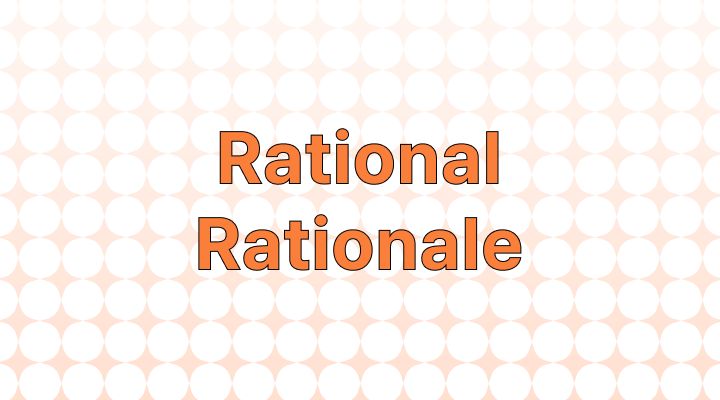- "Rational" refers to something based on reason, logic, or sound judgment, indicating a thoughtful and sensible approach.
- "Rationale" is the underlying reason or justification for a decision, action, or belief.
💭 The manager explained the rationale behind the company's strategic shift in a detailed presentation.

When to use "rational" and "rationale"
They might sound similar, but "rational" and "rationale" have distinct meanings:
Rational:
- Usage: Use "rational" to describe a person's behavior, thoughts, decisions, or arguments that are logical, reasonable, and based on sound judgment.
- Example Contexts: Making a rational choice, providing a rational explanation, having a rational discussion.
Rationale:
- Usage: Use "rationale" to refer to the underlying reason, justification, or explanation behind a decision, action, or belief.
- Example Contexts: Explaining the rationale for a business decision, presenting the rationale for a policy change, understanding the rationale behind a scientific hypothesis.
Remember, rational is an adjective used to describe something reasonable, while rationale is a noun used to describe the reasons themselves.
The word "rational" is an adjective describing logical thinking or behavior, while "rationale" is a noun denoting the underlying reason or justification. Remember this by thinking of "rationale" as containing the word "rational", since a rationale would ideally be rational!
The use of "rational" and "rationale" over time
As shown in the graph below, we can see that "rational" and "rationale" have both seen some fluctuations in use throughout time, although "rationale" emerged in the popular vocabulary much later. "Rational" remains more commonly used than "rationale."

Examples sentences for "rational"
- He made a rational decision after carefully weighing the pros and cons.
- In a crisis, it's essential to maintain a rational mindset for effective problem-solving.
- The professor's explanation was clear, concise, and highly rational.
- Despite the chaos, she remained rational and focused on finding a solution.
- A rational approach to budgeting ensures financial stability.
Examples from the web
"An organization that’s all about finding a rational middle to achieve a just energy transition." - U.S. News
"Your Stock-Market FOMO Is Rational" - The Wall Street Journal
Example sentences of "rationale"
- The document outlined the rationale behind the proposed changes in the curriculum.
- During the meeting, the team discussed the rationale for choosing a different marketing strategy.
- The scientist presented a detailed rationale for conducting the experiment in a specific way.
- Understanding the rationale behind the policy shift is crucial for employees.
- The CEO explained the rationale for the company's expansion into international markets.
Examples from the web
"A polarized environment that leaves little option but to expansively explain the rationale for any decision." - New York Times
"A rationale as plain as it was misleading" - The Guardian
FAQs
What is the difference between rational and irrational numbers?
Rational numbers can be expressed as fractions or ratios of integers, where the numerator and denominator are both integers. In contrast, irrational numbers cannot be represented as fractions and have non-terminating, non-repeating decimal expansions.
What is the difference between a rationale and an introduction in a research paper?
The introduction of a research paper introduces the research topic, provides background information, and outlines the paper's structure without delving deeply into the specific details of the research justification. The rationale, on the other hand, is usually a more specific section which explains the justification, significance, and objectives of the study, often involving a literature review and problem statement.
The rationale is often included as a part of the introduction in research papers.
Summary
In this post, we explored the nuances between the words "rational" and "rationale." While "rational" functions as an adjective describing logical thinking or behavior, "rationale" serves as a noun, representing the underlying reason or justification for a decision, action, or belief. Hopefully, you can now grasp the subtle differences between these commonly interchanged words!

Want to sound like a native speaker?
Engram’s AI-powered grammar checker makes your English sound like a native speaker’s, suggesting natural English expressions on top of fixing grammar, spelling, punctuation, word order, and vocabulary.

References:















